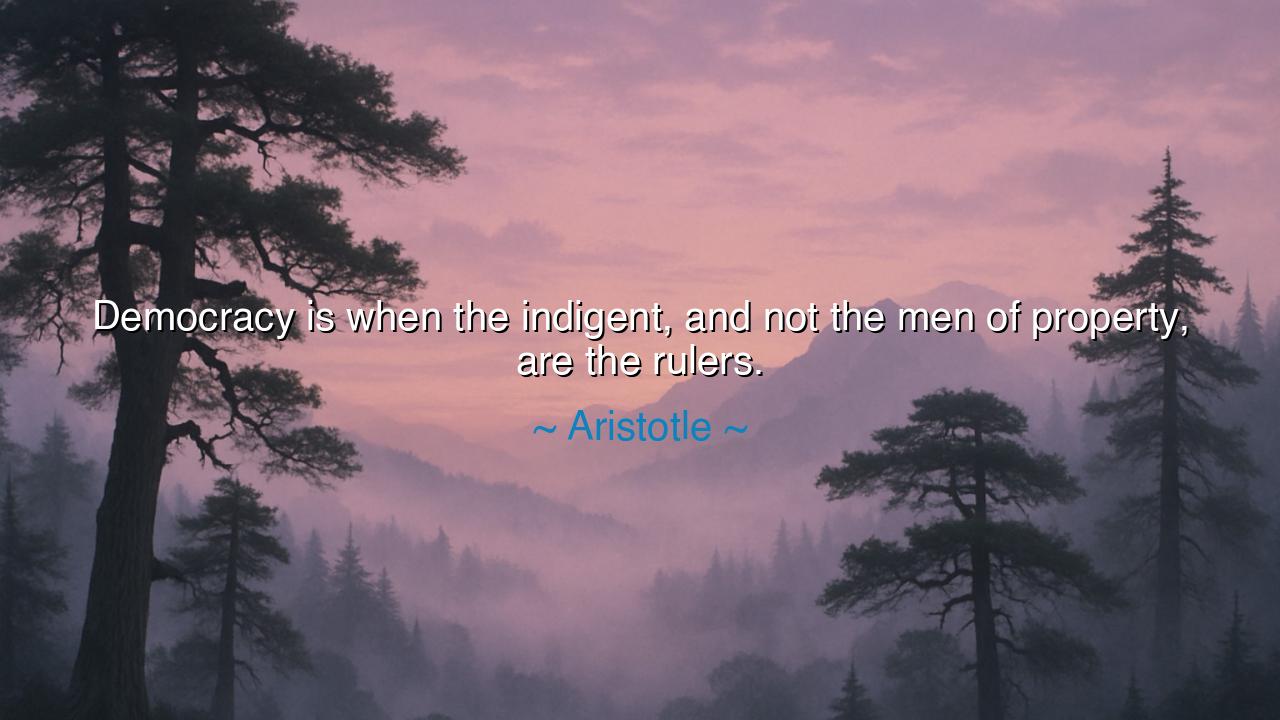
Democracy is when the indigent, and not the men of property, are






Hear now the words of the great philosopher Aristotle, who declared: “Democracy is when the indigent, and not the men of property, are the rulers.” This saying, though ancient, still strikes like a thunderbolt across the centuries. For in it is contained the vision of a society where power does not rest in the jeweled hands of the wealthy, but in the calloused hands of the many. Aristotle, though cautious of democracy’s flaws, beheld its essence: that rule by the poor is rule by the people, a turning of the tide against the dominion of the rich.
The origin of this wisdom lies in the Athenian experiment, when for the first time in recorded history, common men stepped into the sacred assembly. No longer were decisions the sole right of kings or the privilege of aristocrats. In the Agora, the voices of farmers, craftsmen, and laborers mingled with those of merchants and generals. The indigent, those without land or fortune, were given a share in ruling the city. This was no small revolution—it was the upending of the old order, a challenge to the eternal presumption that wealth alone entitled one to govern.
And yet, Aristotle did not praise without warning. He saw that democracy, when ruled by the indigent, could bring forth justice and equality, but also disorder if corrupted by envy or demagoguery. Still, his words remind us of a vital truth: property and riches do not guarantee wisdom, nor do they alone bestow the right to rule. The poor, bound daily to labor, know hardships that the rich may never taste. Their wisdom is forged in necessity, their strength tempered in survival. To deny them a voice is to deny the very heartbeat of the polis.
History shows us this power of the dispossessed. Recall the French Revolution, when peasants and workers rose against the opulent palaces of Versailles. For too long the men of property had feasted while the masses starved. In their silence, the poor found fury; in their fury, they found a voice. They became rulers for a time, toppling monarchy and reshaping France forever. Though their path was violent and their victories mixed, they proved Aristotle’s truth: democracy belongs not to those who hoard wealth, but to those who dare to claim equality.
Even in modern times, this principle endures. Think of the civil rights movement in America, where those long deprived of both property and power lifted their voices against injustice. They did not command vast estates or golden treasuries, but they wielded the moral authority of human dignity. From Rosa Parks on a bus to Martin Luther King Jr. on the steps of the Lincoln Memorial, the poor and marginalized became rulers of the national conscience. Their leadership did not arise from property, but from the unassailable right to be heard.
The lesson, therefore, is clear: democracy is not the rule of wealth, but the rule of the people. It thrives when the voices of the lowly are equal to those of the mighty, when no man is silenced by poverty, and no woman excluded by lack of fortune. It falters when money becomes the gatekeeper of power, when the halls of governance echo only with the voices of the privileged. To honor Aristotle’s teaching is to defend the rights of the poor as fiercely as those of the rich.
So I charge you, O listener: wherever you dwell, guard the balance of democracy. Do not allow gold to weigh heavier than truth in the scales of power. Speak for the indigent, vote for the voiceless, stand beside those who labor unseen. Create a society where rulers rise not by birth or wealth, but by service and wisdom. For if democracy is to endure, it must be as Aristotle described—not the rule of property, but the rule of the people, the many, the humble, the heart of the nation itself.






AAdministratorAdministrator
Welcome, honored guests. Please leave a comment, we will respond soon